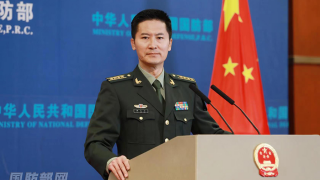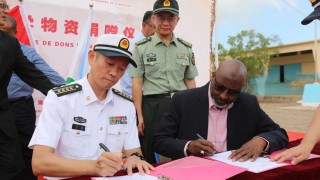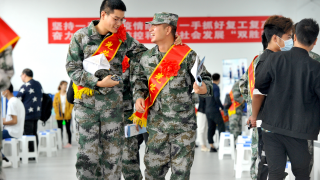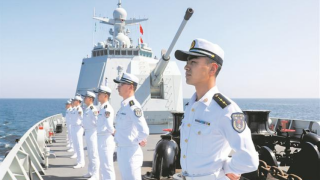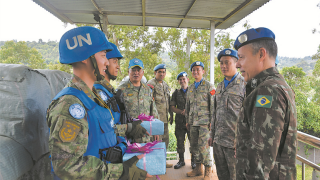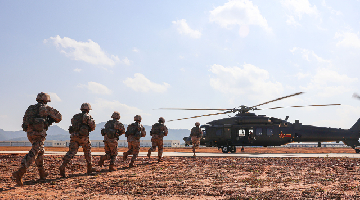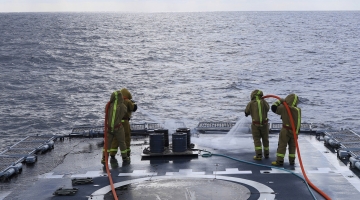By Wang Xiaopeng
The Association of Southeast Asian Nations (ASEAN) Foreign Ministers Retreat was held in Jakarta on February 4, 2023. Retno Marsudi, foreign minister of Indonesia, said after the meeting that Indonesia plans to intensify talks with China and other Southeast Asian countries to finalize the South China Sea Code of Conduct (COC).
Wang Xiaopeng, an expert on maritime issues of the Chinese Academy of Social Sciences, said that against the background that the US and other countries outside the region have been frequently causing troubles in the South China Sea recently, Indonesia, who holds the rotating chair of ASEAN this year, has the following two aims in stepping up consultations on the COC.
First, China and ASEAN countries have a basic consensus, which is to formulate the South China Sea COC on the basis of fully implementing the Declaration on the Conduct of Parties in the South China Sea (DOC). On the 20th anniversary of the signing of the DOC in 2022, relevant parties announced that they will further speed up negotiations on the COC. This means that it is the common aspiration of all parties to speed up the negotiation this year so as to maintain peace and stability in the South China Sea.
In addition, as this year's the rotating chair of ASEAN, Indonesia hopes to play a more important leading role. In 2023, ASEAN is facing several major tasks such as implementing the ASEAN Outlook on the Indo-Pacific, accession of Timor-Leste to ASEAN, and negotiating the COC. Indonesia, as the locomotive of ASEAN, hopes to make substantial progress on these tasks during its presidency. The negotiation on the COC is one of the key links.
At the same time, the current affairs background of the Indonesian foreign minister's statement is also worth noting.
The US military activities in the South China Sea have increased significantly in 2023 and there are three reasons behind it.
The first is the strategic factor. The US launched a new version of the "Indo-Pacific Strategy" in early 2022 to push military deployment in the Indo-Pacific from the conceptual stage to the so-called practical stage. In the process, the South China Sea, located at the junction of the Indian Ocean and the Pacific Ocean, has become an experimental field for the US to strengthen dynamic military deployment.
The second is the military alliance factor. The US is currently adjusting its Asia-Pacific military alliance system. It is trying to integrate Japan, the ROK, Australia, and some Southeast Asian countries into a mini-NATO in Asia-Pacific to serve its geopolitical interests. The South China Sea issue is regarded by the US as a kind of strategic glue. The US tries to win allies and partners into its chariot by creating the so-called militarization of the South China Sea.
The third is the propaganda factor. The US has continued to demonstrate its determination in the "Indo-Pacific Strategy" through military activities in the South China Sea. In the relatively short period of time since the beginning of 2023, the US has sent warships and aircraft to the South China Sea many times to demonstrate a policy direction - although the conflict between Russia and Ukraine has drawn a lot of attention from the US, it still regards the "Indo-Pacific Strategy" as its global strategic focus.
For these reasons mentioned above, the US Secretary of Defense visited the Philippines on February 2. From the perspective of regional security, this visit aims to provoke the bilateral relations between China and the Philippines, as well as the strategic mutual trust between China and ASEAN countries. However, the US has largely failed to achieve this goal.
On the one hand, the Philippines opened four additional military bases to the US and the number did not go beyond the general framework of the US-Philippines military alliance. The new Philippine government has not changed its overall diplomatic strategy of balancing major powers. The US deliberately exaggerated the so-called pertinence of such military cooperation, but it did not work. On the other hand, a series of moves by the US that are not constructive to the regional situation have also aroused the vigilance of relevant ASEAN countries. At present, the main goal of ASEAN countries is to promote comprehensive economic recovery and achieve sustainable development, which requires a more peaceful and stable regional security environment. Therefore, the series of actions taken by the US to undermine regional stability are not welcomed by ASEAN countries.
Editor's note: Originally published on the website of Yangtze River News, this article is translated from Chinese into English and edited by the China Military Online. The information and opinions in this article do not necessarily reflect the views of eng.chinamil.com.cn.
